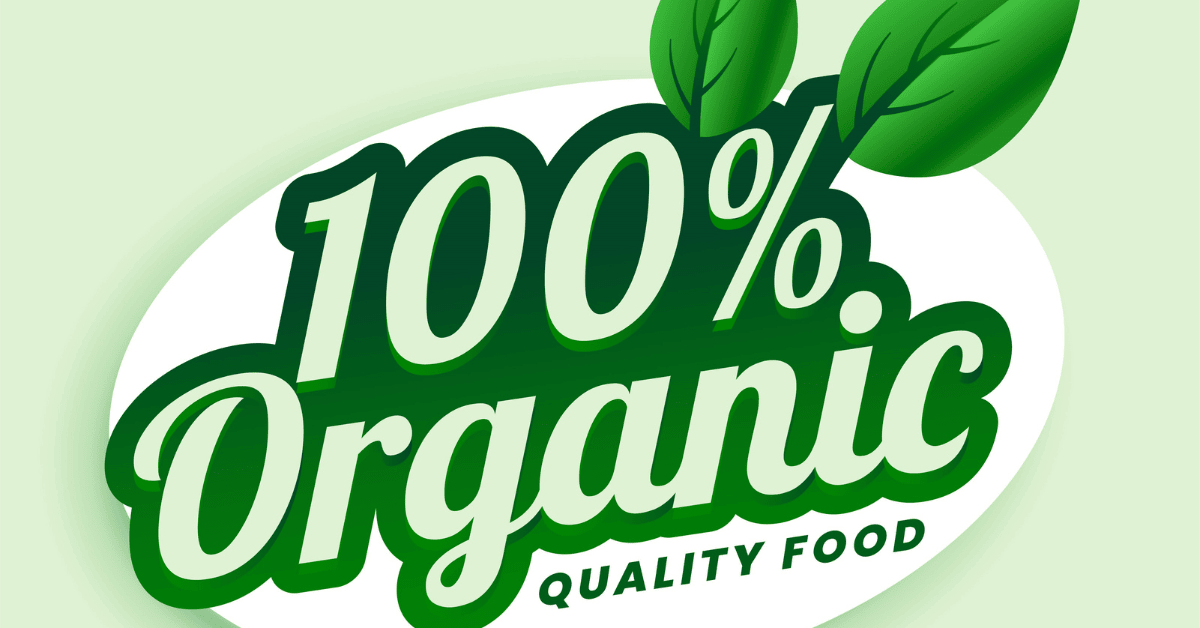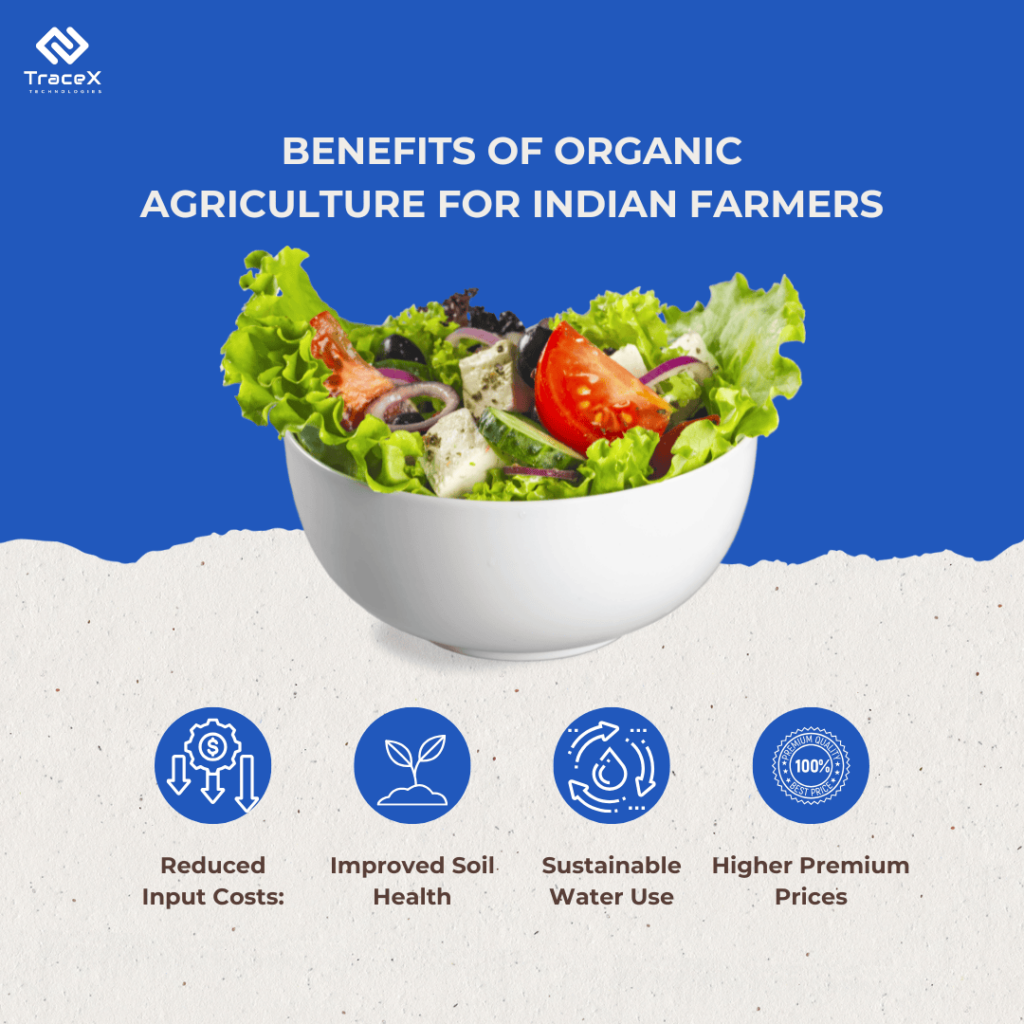Contact: +91 99725 24322 |
Menu
Menu
Quick summary: Discover how the organic food market in India is revolutionizing sustainable agriculture, offering growth opportunities for farmers and driving eco-friendly practices.

The organic food market in India has gained significant traction in recent years. With growing awareness about health and environmental issues, more consumers are opting for organic produce. Imagine a world where your food not only tastes good but is also good for the planet. That’s the promise of organic farming, and in India, it’s becoming more than just a trend—it’s a movement.
As per a recent study conducted by the IMARC Group, the organic food market in India achieved a noteworthy size of $1,582.2 million in 2023. Anticipated to grow at a Compound Annual Growth Rate (CAGR) of 21.19 percent, the market could soar to $8,918.5 million by 2032.
With increasing climate concerns and pressure on farmers to produce sustainably, the question remains—can the organic food market truly drive the change India needs? For many farmers, transitioning to organic methods is daunting, requiring time, resources, and support. Yet, this shift holds the key to a more sustainable future for agriculture in the country.
Key Takeaways
Before diving into the market’s impact, let’s quickly define what organic farming entails. Organic farming is a method of growing crops without the use of synthetic pesticides, fertilizers, or genetically modified organisms (GMOs). Instead, it relies on natural processes like crop rotation, green manure, compost, and biological pest control. This form of agriculture aims to maintain soil health, conserve biodiversity, and minimize environmental pollution.
Organic farming is making a real difference in India, not just for the farmers but for the environment too. By using natural methods instead of chemical fertilizers and pesticides, organic farming helps keep the soil healthy, which means better crops over time. This approach also protects water sources from pollution and encourages more biodiversity—think of more birds, insects, and healthier plants working together.
For farmers, it can mean a more stable income. Consumers are willing to pay a bit more for organic products, which can be a game-changer for small-scale farmers. It’s also safer for them to work without being exposed to harmful chemicals.
Plus, organic farming helps in the fight against climate change. Healthier soils can absorb more carbon from the atmosphere, acting like a sponge for greenhouse gases. So, every time we buy organic, we’re supporting a way of farming that’s kinder to the planet and better for the people growing our food.
It’s not always easy, though—transitioning to organic takes time and effort. But with growing awareness and support, organic farming is showing that it’s possible to feed people while taking care of the Earth.
The organic food market in India has experienced robust growth over the past decade.
According to various industry reports, India is one of the largest producers of organic food globally, with over 2 million hectares of land dedicated to organic farming.
The market has expanded from niche health stores to mainstream supermarkets and online platforms, making organic products more accessible to consumers across the country.
This substantial expansion creates considerable opportunities for enterprises within the organic food industry, while also posing challenges related to supply chain management, marketing strategies, and consumer. This growth is fuelled by increased consumer awareness about the harmful effects of chemical residues in conventional produce and the environmental damage caused by industrial farming practices. As a result, many Indians are turning to organic food as a healthier and more eco-friendly option.
One of the core principles of organic farming is maintaining soil health. Organic farmers use natural methods like composting and crop rotation to improve soil fertility. These practices help replenish the nutrients in the soil, leading to healthier crops and reduced dependency on synthetic fertilizers.
The widespread adoption of organic farming practices is gradually reversing the damage caused by years of intensive chemical use. In states like Sikkim, which became the first 100% organic state in India, there’s been a marked improvement in soil health. This shift is also reducing the runoff of harmful chemicals into rivers and groundwater, helping to maintain cleaner water sources.
The demand for organic food is pushing more farmers to transition to organic methods, which in turn promotes better soil management and reduces pollution levels.
Organic farming encourages biodiversity, which is essential for a resilient agricultural ecosystem. Unlike conventional farming, which often focuses on monoculture (growing a single crop repeatedly on the same land), organic farming encourages crop diversity. Farmers grow multiple crops together or in rotation, which helps maintain a balanced ecosystem.
This diversity is crucial for reducing pest infestations naturally and preventing soil erosion. It also helps farmers mitigate the risks of climate change, as a diverse range of crops can adapt better to varying weather conditions.
The rise of organic food markets in India is incentivizing farmers to diversify their crops, leading to a healthier and more sustainable ecosystem. By adopting organic methods, farmers are also contributing to the conservation of native plant varieties and traditional crops, which are often more resilient to local pests and climate challenges.
A significant portion of India’s organic food is produced by small and marginal farmers. For many of these farmers, organic farming has become a way to improve their livelihoods while reducing input costs. Unlike conventional farming, where the cost of synthetic fertilizers and pesticides can be a significant burden, organic farming relies on locally available organic inputs, making it more accessible for small-scale farmers.
The growing demand for organic food has created a new market where farmers can get premium prices for their produce. This has empowered small farmers to adopt sustainable practices and earn better incomes. Many cooperatives and farmer producer organizations (FPOs) are also stepping in to help small farmers with certification, training, and market access, making the transition to organic farming easier.
Consumers today are not just looking for organic labels; they want to know where their food comes from and how it is grown. This shift has pushed the organic food industry to become more transparent about its practices. Organic certification processes in India require stringent adherence to certain standards, and this has encouraged better record-keeping and traceability among farmers.
Traceability systems ensure that each step of the supply chain—from farm to fork—is monitored. This transparency builds trust between producers and consumers, ensuring that the organic food they purchase is genuinely chemical-free.
This focus on transparency is fostering a more ethical food system, where consumers have confidence in the products they buy, and farmers are motivated to maintain high standards of sustainability.
Organic India transformed its operations with TraceX’s traceability solutions, achieving streamlined agricultural processes and digitized farm management. By adopting these solutions, they were able to track regenerative practices, optimize procurement, and ensure complete product traceability. Additionally, TraceX helped Organic India validate quality certifications, building trust with consumers and ensuring high standards. This integration empowered Organic India to deliver healthier, transparent, and certified organic products to the market, strengthening their commitment to sustainability.
Organic farming practices are often more climate-friendly compared to conventional methods. By avoiding synthetic fertilizers and focusing on soil health, organic farming can help sequester carbon in the soil, reducing greenhouse gas emissions. The organic food market, by encouraging more farmers to adopt such methods, is playing a role in the fight against climate change.
Many organic farms also practice no-till or low-till farming, which further reduces the carbon footprint. These practices not only contribute to the reduction of carbon emissions but also help in building resilience against the effects of climate change, such as droughts and erratic rainfall.
The organic food market in India is not just about healthier food choices; it’s also about supporting local economies. By choosing organic produce, consumers are often supporting local farmers directly, as organic produce is often grown by small-scale farmers. This helps in keeping the local food economy vibrant and resilient.
When consumers buy organic products at farmers’ markets, local grocery stores, or through direct-to-consumer models, they contribute to a more sustainable food system. This also reduces the carbon footprint associated with transportation and storage, making it an eco-friendlier option.

Technology solutions can greatly ease the challenges of transparency, record-keeping, and traceability in the organic food industry. By leveraging digital tools, farmers can more efficiently manage data related to their farming practices, certification processes, and supply chain activities. This allows them to meet the stringent requirements of organic certification without getting bogged down in manual processes. Technology also enables real-time data sharing across the supply chain, giving consumers a clearer picture of where their food comes from and how it was produced.
TraceX Food Traceability Platform addresses these needs by using blockchain technology to provide a secure and transparent system for tracking produce from farm to fork
1. Digitized Record-Keeping: The platform allows farmers to easily record information about their practices, inputs, and harvests digitally. This ensures that records are accurate, consistent, and accessible for certification bodies.
2. Enhanced Transparency: Blockchain creates a tamper-proof ledger, meaning all data about a product’s journey—from the field to processing to packaging—can be viewed without fear of alteration. This helps build trust with consumers by providing verified information about the origins and journey of their food.
3. Simplified Certification Compliance: With real-time data tracking and automated report generation, TraceX helps organic farmers maintain compliance with certification standards. It minimizes the administrative burden and reduces the risk of errors, making it easier for farmers to meet the strict requirements of organic labelling.
The organic food market in India is more than just a trend; it’s a movement towards a sustainable future. By supporting organic farming practices, the market is contributing to healthier soil, greater biodiversity, and improved livelihoods for small-scale farmers. It’s also fostering a food system that prioritizes transparency, traceability, and environmental responsibility.
As more consumers become aware of the benefits of organic food, the ripple effect on sustainable agriculture will continue to grow. For farmers, the shift towards organic methods is not just a path to better income but a way to preserve the environment for future generations. For consumers, it’s a step towards a healthier lifestyle and a more sustainable planet.
Together, the growth of the organic food market and the adoption of sustainable farming practices can lead India towards a more resilient and eco-friendly agricultural system. And as India navigates the challenges of climate change and food security, the organic food market will play a crucial role in shaping a sustainable future for all.
The demand for organic food in India is driven by growing consumer awareness about health and wellness. With increasing concerns over pesticide residues and chemically laden food, more people are looking for safer and healthier alternatives. Organic products are perceived as more nutritious and free from harmful chemicals.
Organic farming supports sustainability by avoiding the use of synthetic chemicals, fertilizers, and genetically modified organisms (GMOs). This reduces soil and water pollution, preserving the quality of natural resources. It emphasizes crop rotation, composting, and natural pest management, which help to maintain soil health and biodiversity. Organic practices also focus on reducing greenhouse gas emissions and improving the carbon content of the soil, making it a climate-friendly choice.
Organic farming in India faces challenges like high certification costs, limited access to organic inputs, and lower yields compared to conventional farming, especially in the initial years of transition. Farmers also struggle with proper record-keeping and maintaining traceability to meet certification requirements. Additionally, organic products often have higher prices due to the costlier production process, making it difficult to compete with conventional produce.
